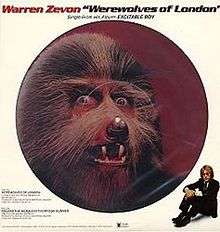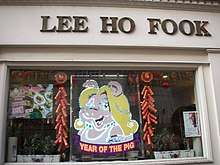Werewolves of London
| "Werewolves of London" | ||||
|---|---|---|---|---|
 | ||||
| Single by Warren Zevon | ||||
| from the album Excitable Boy | ||||
| B-side | "Roland the Headless Thompson Gunner" | |||
| Released | January 18, 1978 | |||
| Format | 7" single | |||
| Recorded | 1977 | |||
| Genre | Rock | |||
| Length | 3:27 | |||
| Label | Asylum Records | |||
| Songwriter(s) | LeRoy Marinell, Waddy Wachtel, Warren Zevon | |||
| Producer(s) | Jackson Browne, Waddy Wachtel | |||
| Warren Zevon singles chronology | ||||
| ||||
"Werewolves of London" is a rock song performed by American singer-songwriter Warren Zevon. It was composed by Zevon, LeRoy Marinell and Waddy Wachtel and was included on Excitable Boy (1978), Zevon's third solo album. The track featured Fleetwood Mac's Mick Fleetwood and John McVie on drums and bass respectively. The single was released by Asylum Records and was a top 40 US hit, reaching No. 21 on the Billboard Hot 100 that May.[1]
Background and recording
The song began as a joke by Phil Everly (of The Everly Brothers) to Zevon in 1975, three years before the recording sessions for Excitable Boy.[2] Everly had watched a television broadcast of the 1935 film Werewolf of London and "suggested to Zevon that he adapt the title for a song and dance craze."[2] Zevon, Marinel and Wachtel played with the idea and wrote the song in about 15 minutes, all contributing lyrics that were transcribed by Zevon's then-wife Crystal. The song is in the key of G major, with a three-chord progression that runs throughout.[3] However, none of them took the song seriously. Soon after, Zevon's friend Jackson Browne saw the lyrics and thought "Werewolves of London" had potential and began performing the song during his own live concerts. Backed by Bob Neuwirth and Guam, T-Bone Burnett also performed the song (with alternate or partially improvised lyrics referencing stars from classical Hollywood cinema, Jimmy Hoffa, Marilyn Chambers and Linda Lovelace) on the first leg of Bob Dylan's Rolling Thunder Revue tour in the autumn of 1975.[4] "Excitable Boy" and "Werewolves of London" were considered for but not included on Zevon's self-titled second album in 1976.[5]
According to Wachtel, "Werewolves of London" was "the hardest song to get down in the studio I've ever worked on."[6] However, Wachtel "laid down his solo in one take."[7] They tried at least seven different configurations of musicians in the recording studio before being satisfied with McVie and Fleetwood's contributions.[2] The protracted studio time and musicians' fees led to the song eating up most of the album's budget.
Over Zevon's objections, Elektra Records chose "Werewolves of London" as the album's first single (he preferred "Johnny Strikes Up the Band" or "Tenderness on the Block").[2] The song was a quick hit, staying in the Billboard Top 40 chart for over a month.

Personnel
Reception and legacy
BBC Radio 2 listeners rated it as having the best opening line in a song.[8]
Zevon later said of the song, "I don't know why that became such a hit. We didn't think it was suitable to be played on the radio. It didn't become an albatross. It's better that I bring something to mind than nothing. There are times when I prefer that it was "Bridge Over Troubled Water", but I don't think bad about the song. I still think it's funny."[9] He also described "Werewolves of London" as a novelty song, “[but] not a novelty the way, say, Steve Martin’s ‘King Tut’ is a novelty.”[2]
The song had a resurgence in popularity in 1986 due to its use in a scene in The Color of Money, where Tom Cruise dances and lip-synchs to the song in "a particularly memorable scene in which Cruise displayed the depths of his talents at the billiards game of 9-ball."[10]
After Zevon's death in 2003, Browne stated that he interpreted the song as describing an upper-class English womanizer: "It’s about a really well-dressed, ladies’ man, a werewolf preying on little old ladies. In a way it’s the Victorian nightmare, the gigolo thing."[2]
Samples and other versions
- The Grateful Dead covered the song in a number of live concerts in 1978, one of which was released on Red Rocks: 7/8/78. The group resurrected the song for Halloween night concerts in 1985, 1990, and 1991.[11]
- Adam Sandler provided his version for the tribute album, Enjoy Every Sandwich: The Songs of Warren Zevon (October 2004).[12][13][14] Sandler also performed it on the Late Show on 15 December 2004.[15]
- American pop-rocker Masha covered the song for a Three Olives Vodka ad campaign in 2014.[16][17][18]
- Kid Rock sampled this song on "All Summer Long" and credits Zevon as a songwriter.
- Chicago rock band The Mutts covered the song on their 2015 single Ghoul Yer Delusion.
References
- ↑ "Warren Zevon - Chart History". Billboard. Retrieved July 4, 2018.
- 1 2 3 4 5 6 George Plasketes (June 15, 2016). The Secret Inspiration Behind Warren Zevon’s ‘Werewolves of London’, Medium.com, accessed 30 July 2018
- ↑ Stephenson, Ken (2002). What to Listen for in Rock: A Stylistic Analysis, pp. 45–46. ISBN 978-0-300-09239-4.
- ↑ "The Rolling Thunder Revue - Werewolves Of London". Pastemagazine.com. Retrieved 22 September 2018.
- ↑ Zevon, Crystal. I'll Sleep When I'm Dead: The Dirty Life and Times of Warren Zevon, p. 112.
- ↑ Zevon, Crystal. I'll Sleep When I'm Dead: The Dirty Life and Times of Warren Zevon, p. 138.
- ↑ Browne, David (April 12, 2013). "The Knights of Soft Rock". Rolling Stone (1180): 58.
- ↑ Vine, Jeremy (May 2004). "Greatest Opening Song Line – The Winner!". BBC Radio 2. Archived from the original on 8 December 2013. Retrieved 22 October 2014.
- ↑ Stephen P. Wheeler. "Warren Zevon: Your Guide Through Transverse Citye". Rock's Backpages. (Subscription required.)
- ↑ Brad Steiger, The Werewolf Book: The Encyclopedia of Shape-Shifting Beings, 2011, p. 315.
- ↑ "Grateful Dead - Tour Statistics". Setlist.fm. Retrieved July 27, 2018.
- ↑ Deming, Mark. "Enjoy Every Sandwich: The Songs of Warren Zevon – Various Artists | Songs, Reviews, Credits". AllMusic. Retrieved 14 December 2016.
- ↑ Lifton, Dave (3 September 2013). "Adam Sandler, 'Werewolves of London' –- Terrible Classic Rock Covers". Ultimate Classic Rock. Retrieved 19 December 2016.
- ↑ Peisch, Will (30 October 2015). "7 Spooky Bangers and Monster Mash-Ups". The Dartmouth. Retrieved 19 December 2016.
- ↑ Plasketes, George (23 May 2016). B-Sides, Undercurrents and Overtones: Peripheries to Popular in Music, 1960 to the Present. Rutledge. p. 194. ISBN 978-1-31717-113-3.
- ↑ "AdWeek – Ad of the Day: Masha Sings a Sultry Remake of 'Werewolves of London' for Three Olives Vodka". Adweek.com. 2014-12-04. Retrieved 2014-12-04.
- ↑ Elliott, Stuart (8 December 2014). "Ads Imply This Vodka Has a Real 'Bite'". The New York Times. Retrieved 19 December 2016.
- ↑ Lukovitz, Karlene (2 December 2014). "Three Olives Unleashes 'Werewolves in London' 12/02/2014". MediaPost. Retrieved 19 December 2016.
- ↑ Sisario, Ben (2 October 2008). "Kid Rock, Longtime Holdout, Goes Digital With Rhapsody". MediaPost. Retrieved 13 October 2018.